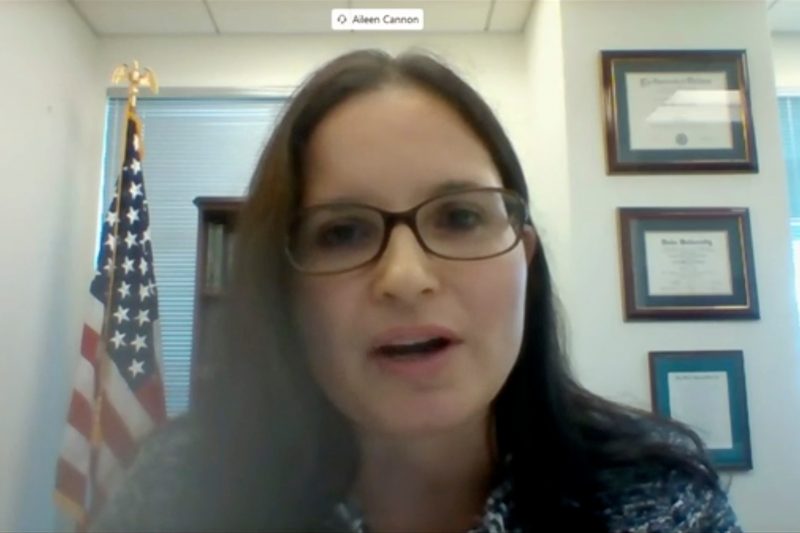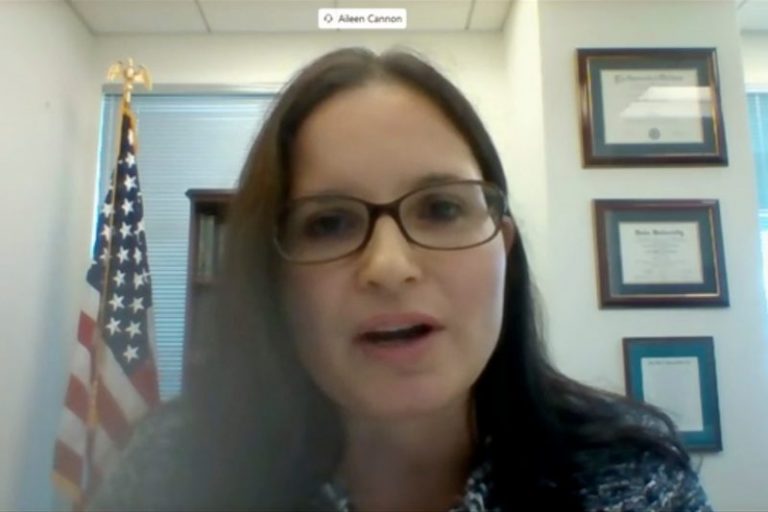
The judge presiding over the Justice Department’s criminal case against former president Donald Trump said Tuesday that the trial could begin as early as Aug. 14 — a timetable that is likely to be pushed back as lawyers navigate the complexities of an unprecedented case that hinges on highly sensitive classified documents.
Judge Aileen M. Cannon, a federal judge in Florida, wrote in a court filing that hearings in the case would be held in her Fort Pierce courthouse, though she noted that location could change as the criminal proceedings get underway.
The government filed its 38-count indictment against Trump and his valet, Walt Nauta, in the West Palm Beach courthouse, about an hour south of Fort Pierce. Cannon has the authority to decide in which of the five divisions within the Southern District of Florida the trial will take place.
“This case is hereby set for a Criminal Jury Trial during the two-week period commencing August 14, 2023, or as soon thereafter as the case may be called. A Calendar Call will be held at 1:45 p.m. on August 8, 2023,” Cannon wrote.
She asked lawyers on both sides to file any pretrial motions by July 24.
The speedy timetable suggests Cannon does not want Trump’s trial proceedings to drag on. But legal experts say the case could face numerous delays because of the rules and procedures related to handling classified information at trial, and is likely to take longer than most to reach a jury.
Trump, the first former U.S. president ever charged with a crime, is accused of illegally withholding 31 documents containing classified national defense information. That means his lawyers need to obtain the necessary security clearance to view the evidence — a process that could take months.
When announcing the indictment, special counsel Jack Smith, who is leading the case for the Justice Department, said he would push for a speedy trial.
Ongoing investigations involving Donald Trump
1/6
End of carousel
Trump is again running for president and is leading in the polls for the Republican nomination. His Florida court proceedings — along with hearings and appearances in an unrelated indictment on fraud charges in New York — appear likely to take place alongside the 2024 primary and general election campaigns.
Trump and some of his GOP competitors have slammed both investigations as partisan. If a Republican is elected president and takes office before the federal trial is concluded, he or she could try to push the Justice Department to drop the charges against Trump, which would end the criminal proceedings.
The case will be tried under the rules of the Classified Information Procedures Act, or CIPA — a law that spells out pretrial steps that must be taken to decide what classified information will be used in court and how. Those steps take time, adding to the likelihood of multiple delays before trial.
David Aaron, a former Justice Department lawyer who prosecuted national security cases, said it’s unlikely that Trump’s lawyers and the Justice Department could conclude the discovery process in time for the trial to begin in August.
Among other things, Aaron said, the law requires the Justice Department to file a motion in court declaring that its case involves classified documents to initiate the CIPA proceedings. Based on what’s viewable on the public court docket, it did not appear that the Justice Department had made that filing as of Tuesday afternoon.
“This could just be a placeholder,” Aaron said of the mid-August timetable laid out by Cannon. “Unless there have been communications that we do not know about and the government has streamlined the usual process and the defense has agreed to that process — this schedule is going to change.”
Legal experts have said Cannon’s lack of experience in trials related to national security also could slow the proceedings. Cannon, 42, was nominated by Trump during his final year in office and has less than three years on the federal bench.
Last fall, she issued a controversial ruling in response to a lawsuit Trump filed that initially delayed the FBI review of classified documents seized at Mar-a-Lago. She was roundly reversed by a conservative panel of the U.S. Court of Appeals for the 11th Circuit.
Federal court officials in southern Florida have said Cannon was assigned randomly to preside over the trial after Trump was indicted by a Miami grand jury this month.


Comments are closed.